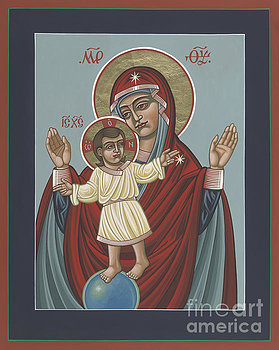 God is the Infinite One God is the Infinite One Sometimes the depth of the mercy and love of God can boggle our mind. I remember a conversation I had with someone who really struggled with it. She became quite animated, saying that she simply could not understand how God could be so forgiving or how He could love so much, and that it made no sense to her. It seemed to me that she was a lot closer to the truth of God’s mercy than she realized. This is because God’s love is completely incomprehensible and unfathomable; there is no way we can know its depths because God cannot be encapsulated into a description or definition. God is the infinite One, who therefore is limitless in His mercy: He is love and He is mercy. On the other hand, our minds are limited, and so we simply cannot ever understand this great and wonderful mystery. Thus, we should be overwhelmed and awed by the mercy of God. Rather than trying to conceptualize this reality, it is better to experience it through a relationship with Him, letting Him reveal His love as He will, allowing it to penetrate our hearts, forming us into people of love and mercy. Therefore, instead of ‘spinning our wheels’ trying to understand the unknowable, it is better to gratefully accept it as a gift beyond description, and then rejoice in it.*  God does not do things as humans do God does not do things as humans do There are many reasons why we struggle to accept the reality that God’s mercy is so great. Sometimes it is because we experience guilt as a result of our sin, a temptation that gives rise to feelings that we do not deserve His forgiveness or mercy.** No matter how ‘bad’ or serious we think our weaknesses, sins, or past actions have been, refusing to forgive ourselves is refusing God’s love. By doing so we are (wittingly or unwittingly) acting as if we know better than God. We are deciding that our judgment is more accurate than His by condemning ourselves when all God wants to do is set us free! The reality is that He forgives us much more readily than we forgive ourselves. In the Gospels, Jesus told Peter and the other apostles that they were to forgive someone 77 times (or 70 x 7 times) which basically means that we are to forgive without limit. He taught that this is so because God forgives us that way. Just think of how many sins all the people of the world have committed throughout history. If it could be counted, the number would be far greater than 77 times for each person, and yet, God never ‘runs out’ of mercy. This limitless mercy is a consistent theme in the teaching of Jesus and is often found in His parables, such as the Lost Son, the Good Samaritan, and the Unforgiving Servant. (Luke 15; Matthew 18:21-35) One that is particularly pointed in revealing that God does not do things as humans do is the parable of God’s generosity: the workers who are all paid equal amounts even though they do not work the same amount of time. (Matthew 20:1-16) This shows that God’s wisdom, as well as the mercy that flows from it, is so great that it is far beyond anything we can comprehend.  "God's mercy is greater than our misery" "God's mercy is greater than our misery" St. Faustina (the saint of God’s mercy), repeatedly referred to the ‘oceans of mercy’ with which God is filled. In her Diary she wrote, “Let no one doubt concerning the goodness of God; even if a person's sins were as dark as night, God's mercy is stronger than our misery.” She continued, “One thing alone is necessary: that the sinner set ajar the door of his heart, be it ever so little, to let in a ray of God's merciful grace, and then God will do the rest.” (#1507) St. Faustina was describing how God’s mercy is healing and that it can change our lives little by little, or even all at once, as God sees fit. She went on to say that while our sins are why Jesus suffered so much in the Garden of Gethsemane, He still accepted them all and carried it to the Cross in order to redeem us. Therefore, to refuse His mercy because it seems too good to be true is to rob ourselves of the entire point of why He came. And even if we do deny His mercy, God is unrelenting: He will continue to offer it anyhow, especially when we see Him face to face at the end of our life.  the Rosary and the Chaplet of Divine Mercy are the two most powerful weapons we have the Rosary and the Chaplet of Divine Mercy are the two most powerful weapons we have The Chaplet of Divine Mercy (given to St. Faustina by Jesus) is a beautiful and powerful prayer that I suggest we make part of our daily prayer.*** I have heard that the Rosary and the Chaplet of Divine Mercy are the two most powerful weapons we have against the powers of evil. I also believe that the more we pray the Chaplet, the more we meditate on God’s mercy, and the more we meditate on God’s mercy, the more we open ourselves up to offering that mercy to others, too. Mercy is at the heart of Christian love and it is a hallmark of discipleship. Perhaps we can spend time meditating on Divine Mercy, praying the Chaplet, and asking for the grace to be filled with the mercy and love of God, especially when we are most challenged by evil, disappointment, or betrayal. If we experience mercy rather than trying to understand it, we are more likely to become channels of it, allowing mercy to transform us into humble disciples. When we do this, we grow in holiness, becoming filled with gratitude in knowing this kind of love is only possible through Him.  may we be open to the Divine Mercy of God may we be open to the Divine Mercy of God May we be open to the Divine Mercy of God so that our lives are transformed! May we ask the intercession of St. Faustina that we might receive the merciful healing graces we need! And may we become people of mercy and love! Let us meet in the merciful heart of Jesus! Peace! ©Michele L. Catanese Notes: * I like this description of mystery: “It is not the human mind that grasps God: the divine majesty grasps us.” (A Concise Dictionary of Theology by Gerald O’Collins, SJ and Edward G. Farrugia, SJ ** To be clear, guilt is not helpful because it usually is a response in which we tear ourselves down or carry a burden we refuse to let go of. Rather, sorrow for our sin is a freeing response. Guilt is anger turned against ourselves such that we ‘beat ourselves up’ about what we have done, etc. Sorrow is when we have remorse, a desire to not sin in the same way again because we have offended God. In guilt we turn inward; in sorrow we turn outward, desiring to be healed, to grow because of our love of God. *** The Chaplet of Divine Mercy: https://www.thedivinemercy.org/message/devotions/pray-the-chaplet Finally, here is a prayer composed by St. Faustina that is a wonderful way to pray for the grace of mercy. A Prayer of St. Faustina May the greatest of all divine attributes, that of Your unfathomable mercy, pass through my heart and soul to my neighbor. Help me, O Lord, that my eyes may be merciful, so that I man never suspect or judge from appearances, but look for what is beautiful in my neighbors’ souls and come to their rescue. Help me, that my ears may be merciful, so that I may give heed to my neighbors’ needs and not be indifferent to their pains and moanings. Help me, O Lord, that my tongue may be merciful, so that I should never speak negatively of my neighbor, but have a word of comfort and forgiveness for all. Help me, O Lord, that my hands may be merciful and filled with good deeds, so that I may do only good to my neighbors and take upon myself the most difficult and toilsome tasks. Help me, that my feet may be merciful, so that I may hurry to assist my neighbor, overcoming my own fatigue and weariness (…) Help me, O Lord, that my heart may be merciful so that I myself may feel all the sufferings of my neighbor. (…) May Your mercy, O Lord, rest upon me.” (#163, Diary of Saint Maria Faustina Kowalska: Divine Mercy in My Soul) https://divinemercy.life/the-prayers-of-saint-faustina/#:~:text=May%20the%20greatest%20of%20all,and%20come%20to%20their%20rescue Images: 1. My photo of a rain cloud coming in over the ocean at Grand Cayman. 2. Painting, The Good Samaritan by Vincent van Gogh. 3. Photo of St. Faustina Kowalska. I love her wry smile in this photo. 4. Icon, Mary Mother of Mercy (Dedicated to Pope Francis in the Year of Mercy) by Fr. William Hart McNichols. You can find this at fineartamerica.com/featured/mary-mother-of-mercy-dedicated-to-pope-francis-in-this-year-of-mercy-289-william-hart-mcnichols.html 5. Painting, Divine Mercy. This was the image St. Faustina had painted at Jesus instructions. It is how she saw Him. Note: In compliance with GDPR rules, I wish to make it clear that I do not gather any information on any of my readers at any time.
Doris
8/10/2023 02:15:51 pm
I feel as though this were written for me. Comments are closed.
|
Heart Speaks to Heart
|

 RSS Feed
RSS Feed

